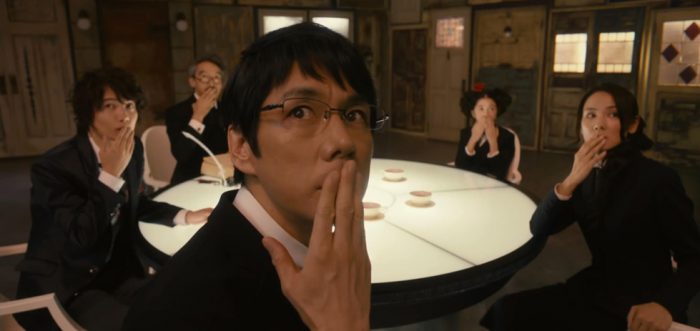
Japanese romantic comedy Poison Berry in My Brain (脳内ポイズンベリー) might have an evocative title, but it’s the premise that gets you in the door. Yōko Maki plays Ichiko Sakurai, an aspiring novelist looking for love whose decisions and thoughts are guided by a boardroom of five separate emotional entities inside her brain. Stop me if you think you’ve heard this one before. A minor controversy emerged in Japan upon the release of Disney Pixar’s Inside Out, which has a strikingly similar conceit to popular manga series Poison Berry in My Brain by Setona Mizushiro. Mizushiro’s first edition was released back in the December of 2009 and Pixar first began developing their script around the same time, yet the end product of each film is markedly different. Inside Out is a touching story for adults and children about learning to cope with sadness and change, whereas Poison Berry (the film) is a conceptual romance that turns into a surprising interrogation of attraction.
The voices in Ichiko’s head are not exactly Joy, Sadness, Anger, Fear and Disgust but they do represent clearly separate functions: Chairman Yoshida (Hidetoshi Nishijima, amusingly Maki’s co-star in J-drama Mozu) is in charge of the mouth, Ishibashi (Ryūnosuke Kamiki) is youthful optimism, Ikeda (Yō Yoshida) is anxiety and negativity, schoolgirl Hatoko (Hiyori Sakurada) is emotional impulsiveness, and the elderly Secretary Kishi (Kazuyuki Asano) is Ichiko’s memory. Their discussions, also unlike Pixar’s film, revolve solely around the pros and cons of relationships, the narrow focus suggesting that perhaps they are one of many separate board rooms within the massive mind castle (which is actually animated in the film). Tonally they waver between being a clinical controlling force and amusing reflective commentators, almost akin to popular Japanese reality television program Terrace House.
Back in the land of the real, Ichiko’s two potential suitors are cut straight out of the Rom-Com Trope Academy: slacker Ryoichi Saotome (Yûki Furukawa), for whom Ichiko forms a near-uncontrollable physical attraction, and her polished and formal editor Ochi (Songha), who gives her the offer of a stable path to marriage. Neither of those characters are particularly interesting but this is partly structural – the film is grounded in Ichiko’s worldview, so we see them through the lens of fantasy, hammered home through the arguments of the board room, who often misinterpret physical and verbal signs from the two men.
What sets Poison Berry apart from many rom-coms of its ilk is in its approach to this love triangle. For much of its runtime it plays with very conventional plot beats, yet fantastically undercuts the familiar trope of the final decision. We’re given the lengthy build-up to Ichiko having to choose between the two men, then a tense time restriction placed upon her, leading to a sudden cut to black and then her chosen partner walks through her front door, leaving us to wait for swelling music and rolling credits that don’t come. Ichiko’s decision isn’t a mark of finality for the film but a narrative pivot, and instead of taking on an optimistic outlook on romance, Poison Berry radically changes gears to explore the slow demise of a relationship and a crushing realisation of self-delusion.
Tomoko Aizawa’s script honours its manga roots in this vein, sudden propelling us into a new narrative episode. Just as the tone of the film becomes more solemn, so too does the inner workings of Ichiko’s mind, and the board meeting goes to some dark places, with one of the characters becoming locked away from the rest of them for an extended period of time. What makes the shift so effective is actually in how light-hearted and funny the preceding section of the film is, despite some eventually annoying repeated character tics in the board room sequences.1
Akio Izutsu’s score also manages to neatly make the switch, its initially jaunty melodic line reappearing in various bittersweet incarnations, as if suffocated by the swell of music around it.2 It’s a very eclectic score too, adapting to fit each scene moreso than forming a cohesive whole. That might sound like a negative but it’s not, only adding to the episodic feel of the film.
It’s a visual departure for director Yûichi Satô, the bright pastel colours much more buoyant and warm than some of his earlier films.3 That noted, the approach to narrative in Poison Berry seems to be familiar territory of sorts, what with him having mined a division between reality and fiction in 2009’s Genkai in a Black Company and also have a board room of five people be a major framing device, as in his 2007 film Kisaragi (which also features a Mozu alum in Teruyuki Kagawa). Nonetheless, Poison Berry in My Brain is an entertaining and unique romantic comedy and, though perhaps not as profoundly moving as its Pixar cousin, is still a more contemplative and weighty look at affection than the initial conceit would have you expect.
